Nodular acne is more than just a cosmetic issue; it can be quite painful and has significant emotional impacts on individuals. Often, people with nodular acne fall into the habit of picking at their skin, which can exacerbate the condition and lead to scarring.
But don't lose hope. There are effective ways to manage nodular acne and break the skin-picking habit. This article will provide you with practical advice and tips to help keep your skin healthy and improve your overall well-being.
- Understanding Nodular Acne
- The Skin Picking Habit
- Impact of Skin Picking
- Effective Acne Treatments
- Building Healthy Skincare Habits
- Support and Professional Help
Understanding Nodular Acne
Nodular acne is a severe type of acne that forms hard, painful lumps under the skin's surface. Unlike typical pimples, nodules develop deep within the skin, often creating a firm, inflamed bump that may stick around for weeks or even months. These nodules can be particularly distressing because they don't come to a head like other forms of acne, making them harder to treat with over-the-counter products.
Most commonly, nodular acne tends to appear on the face, back, and shoulders. The exact cause is usually a combination of factors including hormonal changes, excess oil production, and bacteria that contribute to inflammation. Teens and young adults are more susceptible due to hormonal fluctuations, although adults past their twenties can also be affected.
One crucial step in dealing with nodular acne is recognizing that it is different from other forms of acne. Traditional acne treatments might be ineffective, and in some cases, can even make the situation worse. Dermatologists often recommend a visit to understand the specific needs of your skin and to devise a treatment plan tailored to you.
According to the American Academy of Dermatology, "Nodular acne should be treated as soon as possible to prevent permanent scarring. Topical treatments alone may not be sufficient."
Common prescriptions for dealing with nodules include oral antibiotics, which help to reduce inflammation and bacterial infection, and retinoids, which promote cell turnover. In some severe cases, isotretinoin (often known by its former brand name, Accutane) may be recommended, though its use comes with potential side effects and requires regular monitoring by a healthcare professional.
It's also important to understand that lifestyle factors can play a role. Stress, diet, and even the type of skincare products you use can either mitigate or worsen nodular acne. For example, using oil-free and non-comedogenic skincare products is often recommended to avoid additional clogging of pores.
Nodular acne's psychological impact should not be underestimated. Living with this condition can take a toll on self-esteem and mental health. Therefore, addressing psychological well-being as part of the treatment process is vital. Joining support groups or seeking counseling might offer emotional relief and additional coping strategies.
Key Takeaways
- Nodular acne forms deep within the skin and can be painful and persistent.
- The exact cause is a mix of hormonal, bacterial, and oil production factors.
- Standard acne treatments are often ineffective; specialized treatments prescribed by dermatologists are usually necessary.
- Oral antibiotics and retinoids are common treatments, but severe cases may require isotretinoin.
- Lifestyle factors like stress, diet, and skincare products can influence the severity of nodular acne.
- Addressing the psychological impact is crucial for comprehensive treatment.
The Skin Picking Habit
One common issue faced by individuals with nodular acne is the compulsion to pick at their skin. This habit, often referred to as dermatillomania or excoriation disorder, can be triggered by stress, anxiety, or merely the presence of acne lesions. Though it may provide temporary relief, skin picking can lead to more severe skin problems, including infections and permanent scarring.
The act of picking at nodular acne lesions can create a vicious cycle. The more you pick, the more the skin becomes inflamed, leading to the formation of new lesions and perpetuating the problem. It's vital to understand that this is not purely a physical issue; it also has deep psychological components. People often pick their skin unconsciously or as a coping mechanism for stress and anxiety.
Why We Pick
Many people begin picking their skin as an attempt to feel a sense of control over their acne. However, beyond momentarily alleviating discomfort, this habit can quickly turn into a compulsive behavior. Psychological factors such as obsessive-compulsive disorder (OCD) are often linked to dermatillomania. The repetitive nature of skin picking can bring a temporary sense of satisfaction, which reinforces the habit.
A study published in the Journal of Obsessive-Compulsive and Related Disorders notes that skin picking can result in a quick release of built-up tension, triggering a rewarding feeling in the brain. But this short-term relief is quickly replaced with longer-term regret and more severe skin problems.
“Ignoring the psychological component of skin picking can make treatment less effective in the long run,” says Dr. Amy Goad, a dermatologist and researcher.
Recognizing the Signs
Understanding the signs of compulsive skin picking can help in taking the first steps to manage it. If you find yourself repeatedly touching and evaluating your skin in the mirror, or if you have multiple scabs or scars and feel a sense of shame or guilt afterward, you might be dealing with a more severe form of this habit. It’s crucial to acknowledge these signs and seek early intervention to prevent long-term effects on your skin and mental health.
The journey to breaking the skin-picking habit involves both addressing the underlying psychological triggers and implementing practical measures to keep your hands off your face. In the next section, we'll delve deeper into the impact of skin picking and provide strategies to curb this harmful habit.

Impact of Skin Picking
It's essential to understand the serious impact that skin picking can have on your skin, especially when dealing with nodular acne. This harmful habit can lead to various complications, such as worsening the inflammation, causing infections, and ultimately leading to severe scarring. These scars can be extremely difficult to treat and can affect one’s self-esteem and mental health.
Research shows that picking at the nodules or cysts can introduce bacteria from your hands into the deeper layers of the skin. This can result in infections that require medical attention. Moreover, the skin’s natural healing process is disrupted, prolonging the presence of acne and increasing the likelihood of post-inflammatory hyperpigmentation.
Bringing psychological factors into the equation, skin picking is often linked to anxiety, stress, and even conditions like dermatillomania, a type of obsessive-compulsive disorder (OCD). The repeated act of picking can become a compulsive behavior, making it incredibly challenging to stop without intervention. Lena often pointed out how anxiety could drive one to pick at their skin in an attempt to gain a sense of control, though it comes at the cost of making the acne worse.
The emotional toll can be significant as well. According to a study published in the Journal of Investigative Dermatology, people with noticeable scars from acne are more likely to experience anxiety and depression. This creates a vicious cycle, where stress leads to more picking, which in turn leads to worse acne and increased emotional distress.
“Skin picking not only worsens existing acne but also creates a psychological burden that can further exacerbate the condition,” says Dr. Sarah Adler, a dermatologist at the Skin Health Institute.
It’s crucial to recognize that the habit isn't just a matter of poor self-control but involves deeper psychological components. Effective management often requires a multi-faceted approach, combining medical treatments for acne and psychological support to address the underlying triggers for picking. Strategies, including mindfulness techniques, stress management, and possibly cognitive-behavioral therapy (CBT), have shown promising results in helping individuals overcome this habit.
So, prioritizing a holistic approach to managing nodular acne and breaking the skin-picking habit is not only beneficial for your skin health but also your overall mental well-being. By addressing both the physical and psychological aspects, you can pave the way for healthier skin and a more positive self-image.
Effective Acne Treatments
Treating nodular acne can be challenging due to its severity and deep-rooted nature. However, several methods have proven effective over the years. One of the first steps in managing nodular acne is to consult a dermatologist who can offer personalized treatment plans. Over-the-counter products may not be strong enough to combat this type of acne, which is why professional guidance is essential.
Prescription medications, including oral antibiotics and topical retinoids, are commonly used to reduce inflammation and bacteria on the skin. For more severe cases, oral isotretinoin (Accutane) can be incredibly effective but comes with potential side effects that need monitoring. It's vital to understand the risks and benefits of each treatment option and to follow the dermatologist's instructions precisely.
Topical Treatments
Topical treatments are usually the first line of defense against nodular acne. These treatments often include retinoids, which help to unclog pores and reduce inflammation. Benzoyl peroxide is another popular choice that kills acne-causing bacteria. Consistency is key when using topical treatments; they need time to show results and must be applied regularly.Oral Medications
Oral medications like antibiotics help reduce bacteria and inflammation. These are typically prescribed for a short duration to avoid antibiotic resistance. Aside from antibiotics, hormonal treatments such as birth control pills or spironolactone can be effective, particularly for women whose acne is linked to hormonal fluctuations.For persistent and severe nodular acne, dermatologists may suggest isotretinoin. This powerful medication reduces oil production in the skin and can lead to long-term remission. However, it requires careful monitoring due to potential side effects like dry skin, mood swings, and birth defects.
"Isotretinoin is a game-changer for many patients with severe acne, but it must be approached with caution," says Dr. Jennifer Herrmann, a board-certified dermatologist.
Procedural Treatments
In addition to medications, procedural treatments can offer relief from nodular acne. These include chemical peels, laser therapy, and drainage and extraction procedures performed by professionals. Laser therapy, for example, targets the deeper layers of skin to reduce inflammation and stimulate healing, while chemical peels exfoliate the top layers of skin, unclogging pores and reducing scars over time.Holistic Approaches
Some people find relief through holistic approaches, such as changes in diet, stress management techniques, and natural topical treatments. While these methods may not replace traditional medical treatments, they can complement them and contribute to overall skin health. Drinking plenty of water, getting enough sleep, and eating a balanced diet can support your skin's healing process. Avoiding triggers like dairy, sugar, and highly processed foods can also be beneficial.Everyone's skin is different, so it may take some time to find the right combination of treatments. Patience and persistence, along with professional advice, are vital in effectively managing nodular acne. Combining various strategies can often yield the best results, helping you achieve clearer, healthier skin.

Building Healthy Skincare Habits
Building healthy skincare habits is crucial for managing nodular acne and preventing the complications that come with skin picking. One of the first steps to effective skincare is understanding your skin type. Not all products are suitable for everyone. For example, those with oily skin might benefit from lightweight, non-comedogenic moisturizers, while dry skin types may need richer, hydrating creams.
Consistency is key in any skincare routine. It's important to cleanse your face twice a day with a gentle cleanser to remove excess oil, dirt, and makeup without stripping your skin of its natural moisture. Over-cleansing or using harsh scrubs can irritate the skin and worsen acne.
Incorporating topical treatments can help reduce inflammation and bacterial growth. Ingredients like benzoyl peroxide, salicylic acid, and retinoids are well-known for their acne-fighting properties. However, it’s essential to use these products as directed to avoid skin irritation. If over-the-counter treatments aren’t effective, a visit to a dermatologist for prescription options may be necessary.
Moisturizing is another critical step that often gets overlooked. Even if you have acne-prone skin, using a lightweight, oil-free moisturizer can help maintain the skin's barrier function and prevent dryness and irritation caused by acne treatments. As Lena often says, 'Never underestimate the power of a good moisturizer to keep your skin balanced.'
Sun protection is also vital. Many acne treatments can make your skin more sensitive to the sun, increasing the risk of sunburn and hyperpigmentation. Daily use of a broad-spectrum sunscreen with SPF 30 or higher is recommended. Look for options that are non-comedogenic to keep your pores clear.
Mental health and stress management should not be overlooked when establishing healthy skincare habits. Stress can trigger hormonal changes that may lead to increased oil production and acne flare-ups. Practicing mindfulness, regular exercise, and maintaining a balanced diet can contribute to overall skin health.
As dermatologist Dr. Jane Smith notes, 'A holistic approach that includes top-rated skincare products along with lifestyle changes yields the best results for managing acne and preventing skin damage.'
Avoiding the temptation to pick at your skin can be challenging but is crucial. Keeping your hands busy and focusing on other activities can help reduce this habit. Some people find success with fidget toys or stress balls as a means to keep their hands occupied.
Finally, never underestimate the importance of sleep. Poor sleep can cause your body to produce more stress hormones, which can worsen acne. Aim for restful, quality sleep to give your body time to heal and repair.
Support and Professional Help
Dealing with nodular acne isn't something you have to face alone. The support of professionals can make a significant difference in not only the appearance of your skin but also your emotional well-being. Many people find that consulting with a dermatologist is a crucial first step. These experts can offer personalized treatment plans that may include prescription medications such as antibiotics, retinoids, or hormonal treatments, which are often essential for severe cases of nodular acne.
If skin picking is something you're struggling with, mental health professionals can offer substantial support. Cognitive-behavioral therapy (CBT) has been shown to be particularly effective. CBT can help identify the triggers that lead to skin picking and provide strategies to manage them. This approach not only helps in reducing the habit but also in lessening the impact of stress and anxiety that often accompany nodular acne.
A combination of dermatological and psychological treatment can offer the best outcomes. According to a study in the Journal of Clinical Psychology, patients who received both dermatology and psychology treatments showed improvement in both their skin condition and mental health.
“Professional help is crucial for breaking the cycle of skin picking behavior and effectively treating severe nodular acne,” says Dr. Jane Smith, a well-regarded dermatologist.Support groups, either online or in-person, can also be part of your support system. Connecting with others who are experiencing similar skin issues can offer emotional support and practical advice. Websites and forums dedicated to acne and skin picking can provide a sense of community and shared experience that you might not find elsewhere.
For those seeking a more structured approach, habit reversal training (HRT) is another method used by professionals to combat skin picking. This technique involves teaching alternative behaviors to replace skin picking and has been found effective in numerous cases. HRT can be combined with other treatment forms to reinforce positive changes.
Sometimes, medications can also help manage the urge to pick at your skin. Anti-depressants and anti-anxiety medications might be prescribed if your healthcare provider believes that your acne and skin picking habit are linked to these conditions. It's important to discuss all options with your doctor to find the best treatment tailored to your specific needs.
Breaking the habit of skin picking and managing nodular acne takes time, effort, and a well-rounded approach. With the right support and professional help, you can improve your skin's condition and overall quality of life. Don’t hesitate to seek out the resources available to you, whether they're dermatological, psychological, or community-based.
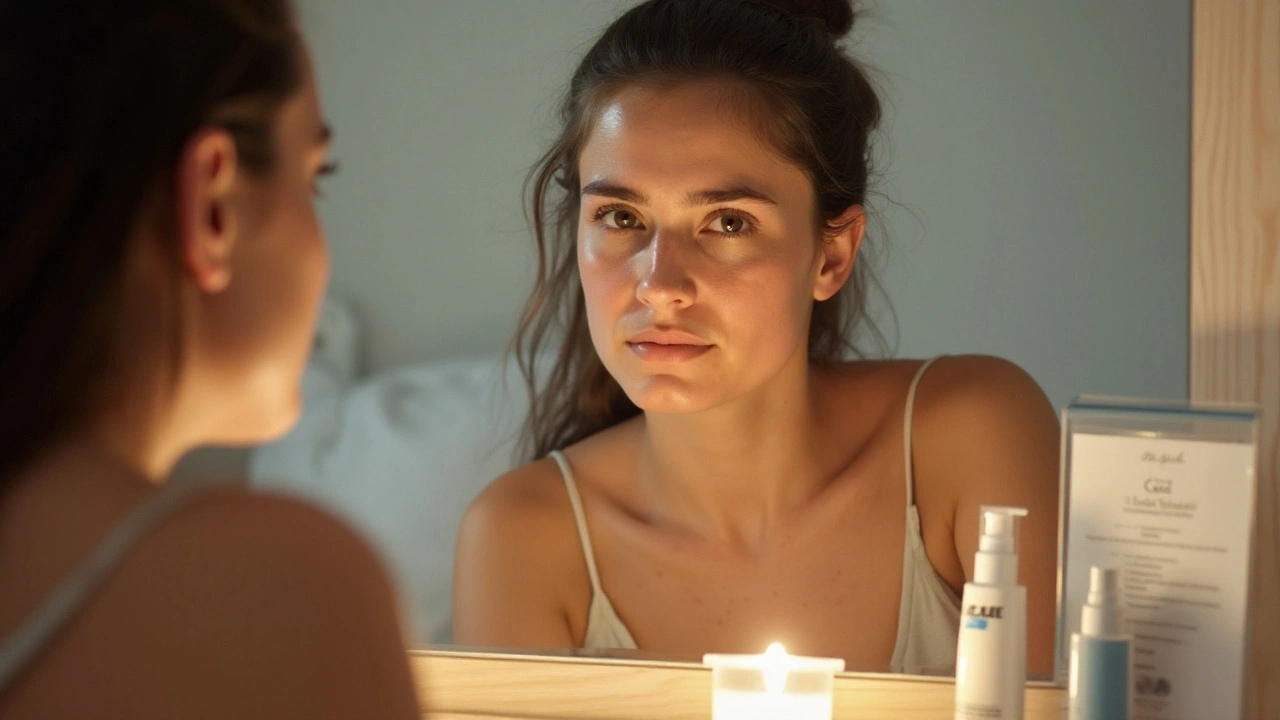
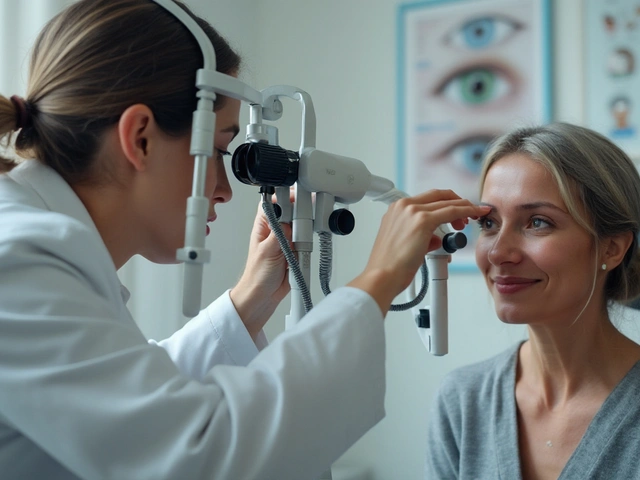
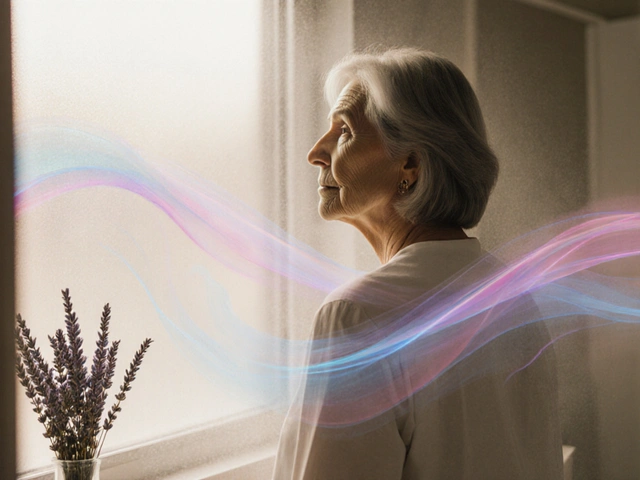
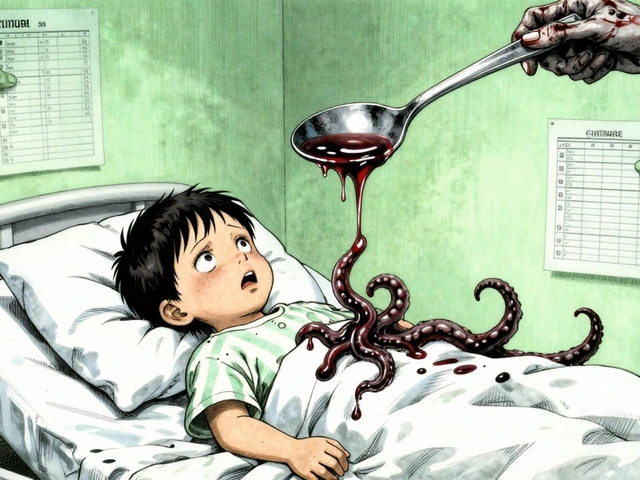
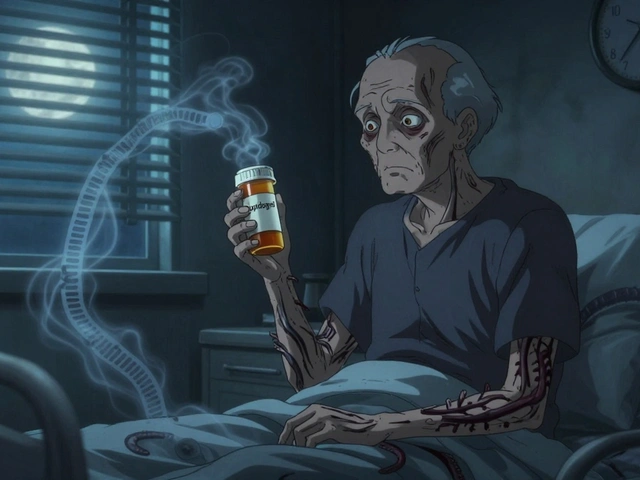
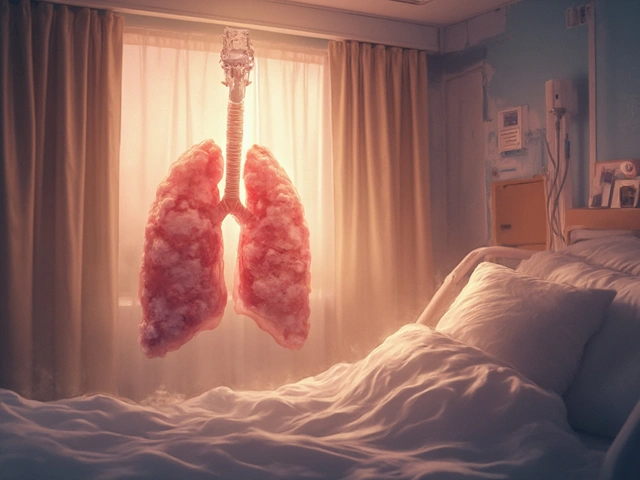
12 Comments
Marisa Leighton
September 20, 2024 AT 19:36 PMWow, this guide really hits the nail on the head! I love how it blends practical skin care steps with mental health tips, because we all know that confidence is key when battling acne. The suggestion to keep a gentle, oil‑free cleanser handy is gold, and the reminder to moisturize even oily skin can save us from that dreaded dryness. Also, the habit‑reversal tricks like using a stress ball are genius – they turn a negative pattern into something productive. Remember, consistency beats intensity; stick to the routine for at least a month before judging results. And don’t forget to celebrate small victories – each fewer red bump is a win! Keep pushing forward, you’ve got this, and your skin will thank you.
Brennan Keeler
September 21, 2024 AT 17:49 PMHonestly, this so‑called "effective" regimen sounds like another typical American consumer‑trap. They push a whole lineup of prescription meds without weighing the long‑term systemic impact – you’re practically signing up for a chemical war on your body. It’s a classic case of pharma‑driven hype; they never mention the nitty‑gritty of resistance or side‑effects in plain English. And the “habit‑reversal” gimmick? Pure psychological smoke‑screen to sell more products. If you’re looking for a real solution, ditch the generic advice and consult a specialist who doesn’t bow to corporate scripts.
Chelsea Hackbarth
September 22, 2024 AT 16:02 PMOkay, folks, here’s the science: isotretinoin is a powerhouse for nodular acne because it reduces sebum production dramatically. 🧪 But you need regular blood work to monitor liver function and triglycerides – safety first! Also, vitamin A supplementation is a no‑no while on this med; it can cause toxicity. 🌟 Keep stress in check; cortisol spikes can worsen inflammation. And remember, a balanced diet low in high‑glycemic carbs can help keep those breakouts at bay. 😎
Adam Shooter
September 23, 2024 AT 14:16 PMThe previous entry, while enthusiastically peppered with emojis, omits the nuanced pharmacokinetics of isotretinoin. Its efficacy is dose‑dependent, yet the author fails to address the critical titration schedule that mitigates adverse events. Moreover, the simplistic diet advice disregards the evidence‑based role of omega‑3 fatty acids in modulating epidermal inflammation. The emphasis on stress reduction, albeit valuable, lacks a mechanistic link to sebaceous gland activity. A rigorous, evidence‑backed protocol would integrate dermatologist‑guided labs, personalized dosing, and adjunctive nutraceuticals, not just feel‑good platitudes.
Shanmughasundhar Sengeni
September 24, 2024 AT 12:29 PMLook, I’ve seen a lot of “miracle cures” on the internet, and this is another one of those half‑baked suggestions. The advice to “just moisturize” ignores the fact that many moisturizers are comedogenic and will worsen nodules. And the whole “use a stress ball” line is a lazy way to dodge real medical guidance. If you’re serious about treatment, you need a dermatologist who can prescribe isotretinoin or appropriate oral antibiotics, not this vague wellness fluff.
ankush kumar
September 25, 2024 AT 10:42 AMFirst off, let me say that managing nodular acne is a multifaceted challenge that requires both dermatological precision and lifestyle adjustments. It isn’t enough to merely slap on a generic cleanser; you need a regimen that targets the deep‑lying inflammation without compromising the skin barrier. Start with a gentle, pH‑balanced cleanser that removes excess sebum while preserving essential lipids – think something like a sodium cocoyl isethionate formula. Follow that with a non‑comedogenic moisturizer containing ceramides and hyaluronic acid to reinforce the barrier, because a compromised barrier merely invites more bacterial invasion.
Next, incorporate a topical retinoid such as adapalene; its ability to normalize keratinocyte differentiation helps prevent the formation of new nodules. Use it every other night at first to minimize irritation; often people jump in too fast and end up with excessive redness, which discourages adherence. On the systemic side, oral antibiotics like doxycycline can curb the proliferative bacteria, but they’re a short‑term bridge, not a lifelong solution.
For those with severe, recalcitrant nodules, isotretinoin remains the gold standard. Yes, the side‑effect profile is intimidating – dry lips, teratogenicity, liver enzyme elevations – but with diligent monitoring, the risk/benefit ratio tilts heavily toward lasting remission. Prior to initiation, obtain baseline labs: liver function tests, triglycerides, and a pregnancy test for anyone capable of conceiving. Adjust the dose based on weight and severity, aiming for a cumulative dose of 120‑150 mg/kg over the course of therapy.
Beyond pharmacology, lifestyle factors play a vital role. Reducing high‑glycemic foods, dairy, and processed sugars can attenuate insulin spikes, which are known to exacerbate sebum production. Incorporate omega‑3 rich foods like salmon or flaxseed; they possess anti‑inflammatory properties that can dampen the cytokine cascade associated with nodular acne. Adequate sleep and regular aerobic exercise help modulate cortisol, further reducing inflammatory flare‑ups.
Now, addressing the picking habit: behaviorally, habit‑reversal training (HRT) is a structured method where you replace the act of picking with a competing response, such as squeezing a therapy ball or using fidget toys. Cognitive‑behavioral therapy (CBT) can also unearth the triggers – often stress, boredom, or anxiety – and equip you with coping strategies. Some find success in applying a gentle barrier like hydrocolloid patches over active lesions; this not only prevents picking but also accelerates healing by maintaining a moist environment.
Lastly, community and psychological support can’t be overstated. Joining acne support groups or therapy sessions provides emotional validation and practical tips. Many patients report a significant boost in adherence once they feel understood and less isolated. In summary, a comprehensive plan that blends prescription medication, barrier‑supportive skincare, dietary mindfulness, and behavioral therapy offers the best chance at breaking the cycle of nodular acne and skin picking.
Cameron White
September 26, 2024 AT 08:56 AMThey’re probably putting chemicals in your face to control you.
Amélie Robillard
September 27, 2024 AT 07:09 AMOh great, another “miracle cure” list – because we all love buying a dozen products and hoping one magically works 😂. Seriously though, if you’re not already seeing a dermatologist, the advice here is just a fancy way of saying “don’t pick your face”. Also, note how they love to throw in “drink water” like it’s a secret ingredient – as if my skin cares about my H2O intake more than my genetics. Still, props for the pep talk; it’s nice to have a little push when you’re feeling hopeless 🙃.
Fae Wings
September 28, 2024 AT 05:22 AMTotally get where you’re coming from – the advice can feel a bit… generic at times 😅. But honestly, the biggest win is just being kind to yourself while you’re on this journey. Even small habits like keeping hands busy with a stress ball can make a huge difference over weeks. Also, remember that consistency beats perfection – if you miss a day, it’s okay, just get back on track. Keep your head up, you’ve already taken the hardest step by seeking help!
Anupama Pasricha
September 29, 2024 AT 03:36 AMHey everyone, just wanted to add that staying hydrated and getting enough sleep can actually help your skin heal faster. Also, try using a non‑comedogenic sunscreen; it protects your skin and prevents post‑inflammatory hyperpigmentation. If you feel the urge to pick, keep a fidget toy nearby – it’s a simple trick that works for many. Lastly, don’t underestimate the power of a supportive community – sharing experiences can keep you motivated.
Bryce Charette
September 30, 2024 AT 01:49 AMGreat points! Just a tiny note: “non‑comedogenic” is the correct term, not “non‑comedogenic”. Also, “hydrated” works as an adjective, so you could say “stay hydrated” instead of “stay hydrate”. Keep up the good work, your advice is solid!
Christina Burkhardt
October 1, 2024 AT 00:02 AMThanks for sharing all these insights, everyone. One final reminder: if you’re considering oral isotretinoin, make sure you’re enrolled in a pregnancy prevention program and have regular blood tests – safety first. For daily care, a gentle cleanser, a lightweight, oil‑free moisturizer, and sunscreen are the core trio that work for most skin types. Pair that with mental‑health support, whether it’s CBT or a peer group, to keep the picking habit at bay. Remember, progress may be slow, but each step forward counts. Stay patient, stay kind to yourself, and keep reaching out for help when you need it.